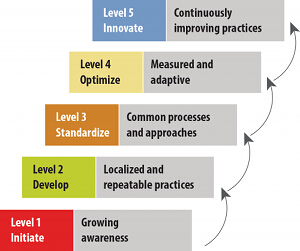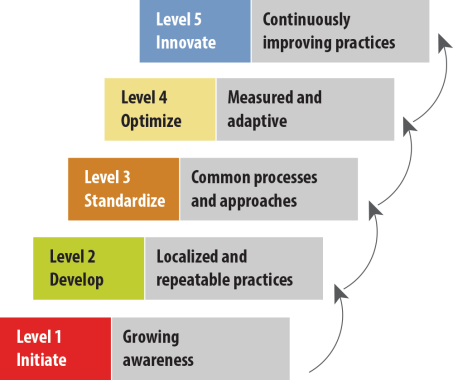When a Lack of Heroics Best Serves Veterans

A good friend and mentor reminds me regularly that knowledge management is a journey, not a destination. Which makes maturity models the boon companion of the KM discipline. This post eyes the prize through the lens of a new volunteer effort that helps military veterans land jobs after they leave service. An interesting trifecta set up to pay dividends for years to come. —Editor
Author: Marilyn Kupetz
My brother is an angel investor in tech startups. He is not interested in small, local efforts without reach, or what his community calls mice. Nor is he interested in elephants—large, established enterprises. What he’s looking for, he tells me, are gazelles, small, high-energy startups that can scale over time and provide his investors with an excellent return. For the past year, MITRE’s Center for Veteran’s Enterprise Transformation has partnered with the Northern Virginia Technology Council to sponsor a particular kind of gazelle, one with the potential for enormous benefits to military veterans.
The pilot program, VETWORKING—and supported by MITRE Volunteers for Veterans (MVV) —aims to help veterans transition to civilian life, advance their career prospects, and position themselves to be more competitive when seeking employment in the Northern Virginia technology sector, in particular, or wherever they choose to settle in the long term. To date, we’ve worked with close to 60 veterans, some of whom NVTC sends us and some who have come to us through referral from our graduates. And “we” means about 75 MITRE staff members from across the company who donate their time, skills, and empathy to the cause.
What gets efforts like these off the ground—energy, commitment, grace, and enthusiasm—eventually requires some taming, however. Even gazelles need boundaries, non-heroic processes, ways to communicate with other gazelles—okay, I’m pushing my metaphor a bit. What high impact ventures need is a way to manage the massive amounts of intellectual capital they generate in the process of taking flight. And to sustain the energy and commitment necessary for ongoing collaboration. And, in our case, to achieve our objectives solely with good will—we are all of us volunteers.
NVTC graciously funds meals, transportation off site, and some administrative support, but planning, creative thinking, documentation, community building—task and knowledge management and organizational development—derive from the collective will to care for those community members who need our perseverance.
Those of us practicing in the KM space understand the requirements perfectly well, and maturity models capture the growth process in helpful ways. So where is the MVV now, and where are we headed? Looking at APQC’s five-step journey is a useful starting point:
Within 12 months, we have managed to build awareness in our community of our efforts, and among ourselves, in terms of simply keeping track of what we have been doing. At present, we are relying on email, Skype, and SharePoint, but we have an external communications tool, Handshake, in our sights, and other tools on our public-facing network are an option, as is a local customer relations management tool that MITRE hosts.
Sweat equity and MITRE’s tool suite brought us through 2014 and Level 1. We are also looking into social media as a tool to encourage veterans to participate in the program. In 2015, the team added a playbook to our operations. The playbook outlines a disciplined, repeatable process for launching and sustaining efforts like ours—so that our industry partners have the chance to build their own programs and serve their own veteran populations. Scale is on the horizon, and all of us know that our personal repeatable processes need to mature so that we can operate, non-heroically, on more than adrenaline.
We’ve begun to discuss approaches to integrating knowledge sharing and collaboration into the way we will do business as we mature the work further, and as we gather metrics to make it clear to others how far we’ve come. We definitely have the will, we see a way, and we’re aiming to report back in a year as to our progress. Winston Churchill had it mostly right: “We make a living by what we get. We make a life by what we give.” And we make it possible to keep giving with disciplined, non-heroic collaboration and sharing processes that are practical, supported, humane, and effective.
We would love to hear from those of you who have also managed to run with gazelles. Where are you now? How did you get there? Reply here if you wish, of course. You can also contact the team directly:
Bill Rajczak wrajczak@mitre.org Corporate Support
Duncan Barry dbarry@mitre.org VETWORKING
Amy Cotter mcotter@mitre.org Mentoring/Communications
Marilyn Kupetz mkupetz@mitre.org Resume Team
Approved for Public Release; Distribution Unlimited. Case Number 15-2129


0 Comments